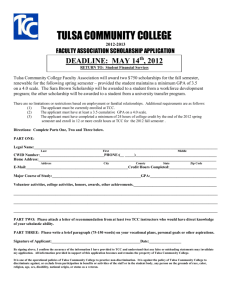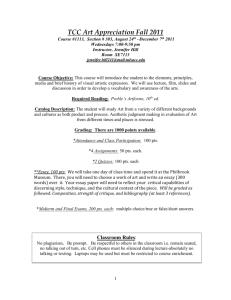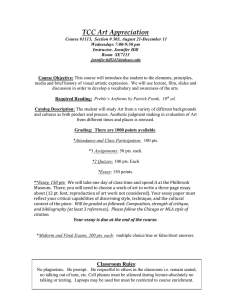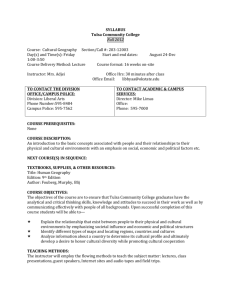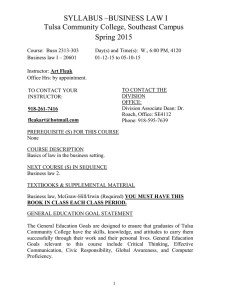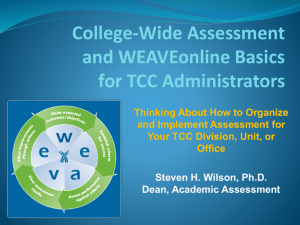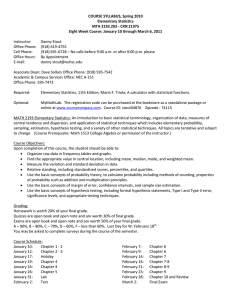new window - Blackboard Learn
advertisement
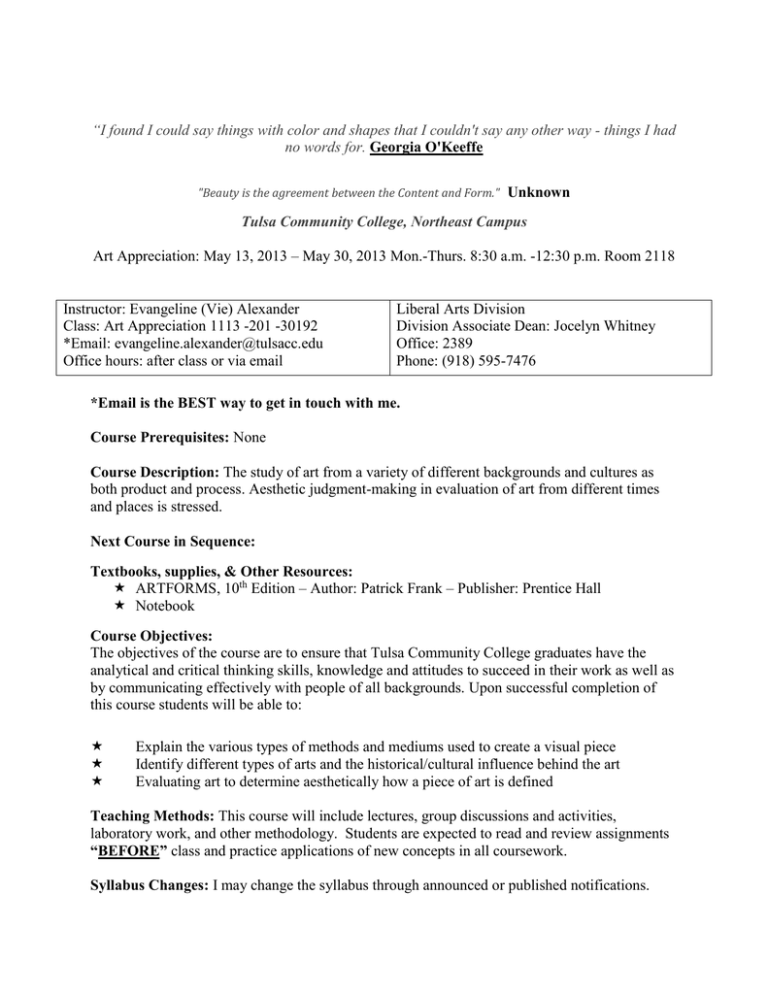
“I found I could say things with color and shapes that I couldn't say any other way - things I had no words for. Georgia O'Keeffe "Beauty is the agreement between the Content and Form." Unknown Tulsa Community College, Northeast Campus Art Appreciation: May 13, 2013 – May 30, 2013 Mon.-Thurs. 8:30 a.m. -12:30 p.m. Room 2118 Instructor: Evangeline (Vie) Alexander Class: Art Appreciation 1113 -201 -30192 *Email: evangeline.alexander@tulsacc.edu Office hours: after class or via email Liberal Arts Division Division Associate Dean: Jocelyn Whitney Office: 2389 Phone: (918) 595-7476 *Email is the BEST way to get in touch with me. Course Prerequisites: None Course Description: The study of art from a variety of different backgrounds and cultures as both product and process. Aesthetic judgment-making in evaluation of art from different times and places is stressed. Next Course in Sequence: Textbooks, supplies, & Other Resources: ARTFORMS, 10th Edition – Author: Patrick Frank – Publisher: Prentice Hall Notebook Course Objectives: The objectives of the course are to ensure that Tulsa Community College graduates have the analytical and critical thinking skills, knowledge and attitudes to succeed in their work as well as by communicating effectively with people of all backgrounds. Upon successful completion of this course students will be able to: Explain the various types of methods and mediums used to create a visual piece Identify different types of arts and the historical/cultural influence behind the art Evaluating art to determine aesthetically how a piece of art is defined Teaching Methods: This course will include lectures, group discussions and activities, laboratory work, and other methodology. Students are expected to read and review assignments “BEFORE” class and practice applications of new concepts in all coursework. Syllabus Changes: I may change the syllabus through announced or published notifications. Attendance and Participation Policy: This class is only three weeks; therefore, attendance and participation are important factors in the success for this class. It is your responsibility to find out what was missed during your absence. Blackboard: I will use Blackboard to communicate any updates and post assignments. Bad Weather or Emergency Cancellation Policy: Tulsa Community College rarely closes. Classes may be cancelled if extreme weather conditions or emergency situations arise. TCC always gives cancellation notices to radio or television stations. This information is also available on the TCC website (www.tulsacc.edu). If this happens, please refer to TCC’s Blackboard site (https://bb.tulsacc.edu) for the course website. Any changes related to the class will be posted on this website. Late Work Policy: Please speak to me in advance if you are not able to complete an assignment on time. I will work with you, but if you do not communicate with me and do not submit an assignment when it is due, you will be docked 10 points for late submissions or a grade of 0 for no submitted assignment. If you are to give an oral presentation, you have to show up on the day that you are scheduled to give your presentation. NO EXCEPTIONS!! If you do not show up on the day that you are scheduled to give your oral presentation, you will receive a zero for that assignment unless you have a doctor’s note and can prove to me that you were very ill on that day. Each student will be held responsible for all class activities, lectures and assignments. If you have an emergency, then email me. Any work completed in class CANNOT be made up. Withdrawal/Audit Policy: The deadline to withdraw from a course shall not exceed 3/4 the duration of any course. The last day to “withdraw” or change from “credit to audit” is ______. Not attending class does not constitute withdrawal from a class. Contact the Advisement Office at any TCC campus to initiate withdrawal from a course (‘W’ grade) or to change from Credit to Audit. Withdrawal and/or change to an audit from a course after the drop/add period can alter the financial aid award for the current and future semesters. Students may receive an outstanding bill from TCC if the recalculation leaves a balance due to TCC. Students who stop participating in the course and fail to withdraw may receive a crouse grade of “F”, which may have financial aid consequences for the student. Classroom Etiquette: Open and mutually respectful communication of varied opinions, beliefs, and perspectives during classroom discussions encourages the free exchange of ideas that is essential to higher learning and to the ability to learn from each other. Reminder: The LAST DAY to withdrawal is Friday, ________ . Cell Phones and Pagers: NO TEXTING WHILE CLASS IS IN SESSION!!!!! All cell phones and pagers must be TURNED OFF or ON VIBRATE during class sessions. If you have an emergency that requires you to keep your cell phone or pager on during class, please notify the instructor(s) BEFORE class begins. In an emergency situation, please LEAVE THE ROOM to answer your cell phone and keep the conversation as BRIEF as possible. You are responsible for any work missed if you have to leave the classroom to answer your cell phone or pager. Americans with Disabilities Act Policy (ADA): Students with DOCUMENTED disabilities are provided academic accommodations through the DISABLED Student Resource Center (918-595-7115), or the Resource Center for the Deaf and Hard of Hearing (918-595-7428(V) or 918-595-7434 TTY). Academic accommodations must be requested in a timely manner. If any student is in need of academic accommodations, it is the STUDENT’S responsibility to advise me so an appropriate referral can be made no later than the “FIRST” week of class. Students may also contact either DISABLED Student Services Office directly at the telephone numbers indicated. Academic accommodations are NOT provided unless appropriate documentation is given to the appropriate DISABLED Student Services Office to support the need for the accommodations. Colleges and Universities are not required to make modifications to assignments or exams. Student Email Communications: All TCC students receive a designated “MyTCC” email address (ex: jane.doe@mail.tulsacc.edu). All communications to you about TCC and some course assignments will be sent to your MyTCC email address. You may use MyTCC email to send email to, and receive email from, me regarding this course or contact at hope_heldmar@mail.tulsacc.edu. Check your TCC email address daily. Academic Dishonesty: Academic dishonesty (cheating) is defined as the deception of others about one’s own work or about the work of another. Academic dishonesty or misconduct is not condoned or tolerated at campuses within the Tulsa Community College system. TCC adopts a policy delegating certain forms of authority for disciplinary action to the faculty. Such disciplinary actions delegated to the faculty include, but are not limited to, the dismissal of disrespectful or disorderly students from classes. In the case of academic dishonesty an instructor may: Require the student to “redo” an assignment or test, or require the student to complete a substitute assignment or test; Record a “zero” for the assignment or test in question; Recommend to the student that he/she “withdraw” from the class, or the instructor can “administratively withdraw” the student from the class without their permission; Record a grade of “F” for the student at the end of the semester. An instructor may request that disciplinary action be taken against a student at the administrative level by submitted such a request to the Dean of Student Services. Plagiarism: Plagiarism is claiming, indicating, or implying that the ideas, sentences, or words of another writer are your own. It includes having another writer do work claimed to be your own, copying work of another and presenting it as your own, following the work of another as a guide to ideas and expression that are then presented as your own. Students should review the relevant sections of the TCC Student Code of Conduct Policy Handbook on the TCC website (www.tulsacc.edu). TCC Institutional Statement: Each student is responsible for being aware of information Contained in the TCC catalog, TCC Student Handbook, Student Code of Conduct Policy Handbook, and semester information listed in the class Topic Outline and Agenda. All information may be viewed on the TCC website (www.tulsacc.edu). TCC Mission Statement: Tulsa Community College betters its community through the intellectual achievement, creative energy, and responsible citizenship of its students, faculty, and staff by their engagement in teaching, learning, and service opportunities that transform and enrich lives. Tulsa Community College commits to innovative, flexible, and affordable public higher education that responds to a dynamic global environment. TCC Core Values: Student Success is the reason TCC exists. We strive for all students to be successful in their education and strive for the education to effectively prepare students for their lives. Learning is the focus because it is the essence of an institution of learning. Excellence drives us. We strive to provide excellent education to our students, excellent resources to our community, and excellent administration and management of our employees. Stewardship guides our daily decision-making. We investigate community needs and expectation and then respond by providing quality education that is responsive, convenient and affordable. Innovation sparks our creativity and ensures that the hearts and minds of our students, faculty, staff and administration are actively engaged in acquiring learning, increasing our knowledge, and leading the community forward. Diversity is our common bond. Sincere appreciation for and cultivation of differences enriches our lives, the community and the education we offer. It is a source of our pride and integral to our success. TCC General Education Goals: Tulsa Community College students will be able to demonstrate: Goal #1: Critical Thinking Critical thinking is the ability to use reasoning skills or strategies to analyze, evaluate and integrate information. Goal #2: Effective Communication Effective communication is the ability to develop organized, coherent, unified written and oral presentations for various audiences and situations. Goal #3: Engaged Learning Engaged learning is meaningful participation in civic, scholarly and cultural activities. Goal #4: Technological Proficiency Technological proficiency includes knowledge of productivity and communication application tools, electronic research capability, and discipline-related technologies. Evaluation Techniques: Grading System-Students are evaluated based on art projects, research paper, oral presentation, museum project, nature project at Woodward Park. A = 450-500; B=400-449 ; C= 350-399 D= 300-349 F – 0-299. Oral Presentation Art Projects in class (10) Philbrook Museum Project (2 visits) Woodward Park Project Research/Final Paper Total Points 100 points 100 points 100 points 100 points 100 points 500 points Woodward Park Project: Details TBA Philbrook Museum Visit: Details TBA. Oral Chapter Presentations: A PowerPoint presentation on a topic from the textbook, which should include a short youtube video or two, proper vocabulary from the text; check the end of the chapter vocabulary list that you are using for your presentation. Research Paper: The written paper must consist of five pages, and must be on one of the topics from the textbook. All students must use MLA format when writing the paper. This paper will include a Works Cited page with five sources; this is the sixth page. Plagiarism violates Tulsa Community College current policy. Tentative Schedule (The instructor reserves the right to alter the schedule through announced changes.) Monday, May 13, 2013: Syllabus introduction and we will introduce ourselves to the class. Choose a topic for research paper, and oral presentation. Part 1 Chapter 1, Chapter 2, Chapter 3 discussion. Video: http://youtu.be/0rwy6IS0cHo “Her Secret is Patience.” Art therapy documentary: http://youtu.be/9zuiDuNwre4 The Power of Art: http://youtu.be/LG1zGY7lE1U Tuesday, May 14: video on drawing http://youtu.be/Xpz4-0MVrTg ; in class art project Wednesday, May 15: Chapter 13 Evaluating Art; what to do in a museum. work on Oral Presentations in class; art project Thursday, May 16: Philbrook Project (We will meet at the museum at 10:00 a.m.) Monday, May 20: Oral Presentations Tuesday, May 21: Gilcrease Museum Wednesday, May 22: Oral Presentations Thursday, May 23: Woodward Park project - We will meet at the park at 10:00 a.m. Monday, May 27: Memorial Day, Tulsa Community College will be closed. No Class!! Tuesday, May 28: Philbrook Museum Project - We will meet at the Philbrook at 10:00 a.m. Wednesday, May 29: remaining oral presentations; time to work on research paper. Thursday, May 30: Final Research Paper is due. Topics for Oral Presentations: Part 3: Art as Cultural Heritage 14 FROM THE EARLIEST ART TO THE BRONZE AGE The Paleolithic Period At the Edge of Art:Stones from Blombos The Neolithic Period The Beginnings of Civilization Mesopotamia Egypt 15 THE CLASSICAL AND MEDIEVAL WEST Greece Art in the World:The Battle of the Parthenon Rome Early Christian and Byzantine Art The Middle Ages in Europe 16 RENAISSANCE AND BAROQUE EUROPE The Renaissance Biography: Temperamental Genius: Michelangelo Buonarroti Baroque Art in the World:Engendering It 17 TRADITIONAL ARTS OF ASIA India Southeast Asia China Japan 18 THE ISLAMIC WORLD Arab Lands Spain Persia India: The Mughal Empire 19 AFRICA, OCEANIA, AND THE AMERICAS Africa Oceania and Australia At the Edge of Art:New Ireland Mask Native North America Biography: Warrior, Captive, and Artist: Howling Wolf Pre-Columbian Central and South America Part 4: The Modern World 20 LATE EIGHTEENTH AND NINETEENTH CENTURIES Neoclassicism Romanticism Photography Realism Biography: Flouting Social Conventions: Rosa Bonheur Impressionism Biography: Guided by Light: Claude Monet The Post-Impressionist Period Biography: Struggling Idealist: Paul Gauguin 21 EARLY TWENTIETH CENTURY The Fauves and Expressionism Cubism Biography: Restless Creativity: Pablo Picasso Toward Abstract Sculpture The Modern Spirit in America Futurism and the Celebration of Motion 22 BETWEEN WORLD WARS Dada Surrealism Expanding on Cubism Building a New Society Political Protest Latin American Modernism American Regionalism Biography: Compelling Autobiographer: Frida Kahlo African-American Modernists Organic Abstraction 23 POSTWAR MODERN MOVEMENTS IN THE WEST The New York School Photography and Architecture at Mid-Century Assemblage Events and Happenings At the Edge of Art:Sensorial Masks Pop Art Biography: The Pope of Pop: Andy Warhol Minimal Art Conceptual Art Site Works and Earthworks Installations and Environments Early Feminism Performance Art Art in the World:Censoring It 24 MODERN ART BEYOND THE WEST Japan At the Edge of Art:Passing Through China India Islamic Lands Africa Part 5: The Postmodern World 25 POSTMODERNITY AND GLOBAL ART Postmodern Architecture Painting Photography Sculpture Public Art Issue-Oriented Art Street Art At the Edge of Art The Global Present

